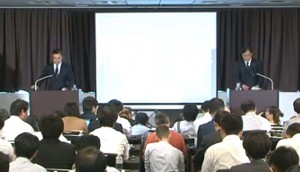Nissan Motor Co. will take a controlling 34% stake in troubled Mitsubishi Motors for $2.2 billion, the two automakers confirmed on Thursday morning, something Nissan CEO Carlos Ghosn described as a “win-win” for both companies.
The announcement came on the same day the larger of the two makers announced that its earnings for the January-March period, the final quarter in its fiscal year, had dropped by 40%, largely due to weak sales and a strong yen.
The decision to acquire a stake in Mitsubishi comes as the smaller maker continues to reveal damaging information about a secret effort to inflate its fuel economy numbers for as much as a quarter century. That scandal — ironically, triggered by concerns at Nissan over the mileage of cars it sells that are produced by Mitsubishi – have hammered the small maker’s sales and led to a more than 40% dip in its share price over the past month.
“We will support MMC (Mitsubishi Motors Corp.) as they address their challenges,” said Ghosn, who was joined by Mitsubishi Chairman Osamu Masuko as the deal was announced in Yokohama, where Nissan is headquartered.
(Nissan reports 34.6% increase in profits for 2015. Click Here for that story.)
It remains to be seen if either Masuko or President and Chief Operating Officer Tetsuro Aikawa will remain with Mitsubishi for any length of time. Both men are planning to leave in the wake of the scandal, at least according to reports in Japanese news outlets.
What’s also uncertain is how the new partners plan to address the deep hole Mitsubishi has found itself in. While an independent panel isn’t expected to issue a final report until sometime over the summer, preliminary findings suggest that junior level engineers have, for 25 years, rigged mileage tests to deliver better numbers for vehicles sold in the Japanese market. The subterfuge was revealed when Nissan questioned data for two Mitsubishi-made minicars it sells, the Dayz and Dayz Roox.
(Will scandal, Nissan deal lead to MMC management shake-up? Click Here for more.)
The new deal calls for Nissan to purchase 506.6 million newly issued shares in Mitsubishi for a total of $2.2 billion. The deal needs to win approval by regulators and current shareholders, but other members of the broad Mitsubishi family, including the Bank of Tokyo-Mitsubishi UFJ, said they will support the purchase. That bank was part of a consortium that bailed MMC out when it nearly went bankrupt a decade ago after a series of financial issues.
For Nissan, it adds another leg in an expanding array of alliance partners. In 1999, the second-largest Japanese automaker was itself rescued from certain collapse by a $6 billion investment from French automaker Renault. The Brazilian-born Ghosn came onboard as part of that deal, ultimately becoming CEO of both automakers.
More recently, the Renault-Nissan Alliance has formed a partnership with German luxury maker Daimler AG, parent of Mercedes-Benz and Smart. Though not as tightly integrated, Daimler has rapidly entered into a series of joint product development, purchasing and manufacturing ventures with Renault and Nissan.
The latest move is expected to add a measure of stability to troubled Mitsubishi that could reassure both shareholders and potential buyers. It will inject some much-needed cash and, according to analyst, provide MMC the ability to combine purchasing and manufacturing operations to reduce costs by improving economies of scale.
“The agreement will create long-term value for our companies to progress towards the future,” said MMC Chairman Masuko.
Nissan, meanwhile, could wind up in a better position to target the critical, if low-margin microcar segment – vehicles known as kei cars in Japan. It comes as a counter-move to the recent acquisition by industry giant Toyota which last year announced the takeover of its long-time affiliate, microcar maker Daihatsu.
“This is a breakthrough transaction and a win-win for both Nissan and Mitsubishi Motors,” declared Ghosn. “It creates a dynamic new force in the automotive industry that will cooperate intensively and generate sizable synergies.”
Though the deal provides a potential safe harbor for Mitsubishi, the company still has a lot of challenges ahead. Some Japanese analysts expect MMC will eventually have to spend over $1 billion to compensate vehicle owners for the cheating. It could also face hefty government fines.
So far, Mitsubishi officials remain firm in declaring the subterfuge was limited to the Japanese market. They specifically insist U.S. fuel economy numbers are accurate.
MMC’s reputation was already tarnished by the revelation it had covered up a safety scandal more than a decade ago that led to at least one death. And it nearly collapsed due to financial mismanagement that forced a consortium of lenders and members of the Mitsubishi family to put together a rescue bid.
Under the new deal, Nissan won’t have complete control over MMC, which will still legally operate as an independent company. “But we will make sure,” Ghosn told the Associated Press, “that change will happen.”
(Nissan isn’t the only automaker under fire for bending the truth, Click Here for more on the industry’s ethical crisis.)



MMTOF has a 5.54B USD Market cap today could be a bargain eventually with some better management and Nissan resources & importantly Mr.Ghosn.
Mitsu made some interesting stuff last ~30 YRS along with the (other) stuff,OK stuff ,Mitsu Patrols & the junk if nothing else they have fixed assets/plants maybe Nissan can utilize .